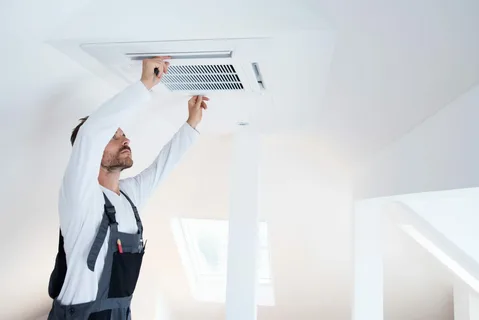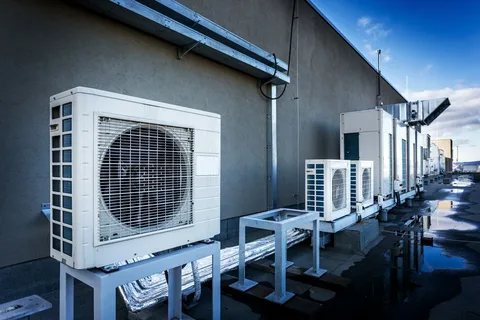Creating a comfortable and energy-efficient home doesn’t have to be a difficult task. Installing a residential air exchanger is an easy way to upgrade your home’s air quality and reduce energy costs. This blog post will discuss how residential air exchangers work, the benefits of installing one in your home, and some tips for choosing the right unit. With the help of the guide, you can quickly and easily improve your home’s air quality while reducing energy costs.
Understanding The Benefits Of A Residential Air Exchanger Upgrade
One of the main advantages is improved indoor air quality. Air exchangers constantly cycle in fresh outdoor air while expelling stale indoor air, effectively reducing the levels of pollutants, allergens, and odors in your home. It is particularly beneficial for individuals with respiratory conditions or allergies.
Another significant benefit is energy savings. By exchanging heat between incoming and outgoing air streams, air exchangers help regulate indoor temperatures and reduce the load on your HVAC system. It can lead to lower energy consumption and subsequently, lower utility bills.
Control Humidity Levels
Improved air quality and energy savings, air exchangers can also help control humidity levels in your home. They extract excess moisture from indoor air during humid conditions and distribute it back during dry periods, ensuring a comfortable living environment.
Furthermore, air exchangers can help mitigate issues like condensation and mold growth. By constantly removing moist air and preventing it from being trapped indoors, they reduce the risk of mold and mildew formation, which can lead to structural damage and potential health hazards.
A residential air exchanger provides numerous benefits, including better air quality, energy efficiency, humidity control, and protection against condensation and mold. Investing in an air exchanger can enhance your home’s comfort and health while saving on energy costs.
Choosing The Right Air Exchanger For Your Home
Choosing the right air exchanger for your home can be a daunting task. However, some key factors must be considered to help you make the right decision. One of the first things to consider is the size of your home. The larger your home, the bigger the air exchanger you will need. The ventilation requirements will also differ based on the climate zone that you live in. In cold climates, you will require an air exchanger that can recover more heat. On the other hand, in warmer climates, an air exchanger that can remove more humidity would be ideal.
You will also need to consider the noise level of the air exchanger. If you plan to install it in a living space or bedroom, you may want to look for a unit with sound-dampening features. Another important factor to consider is the type of filters the unit uses. High-efficiency particulate air (HEPA) filters can effectively remove airborne allergens, pollutants, and irritants. However, these filters require regular replacement, which can add to the cost of ownership.
Air Exchanger For House To Ensure Maximum Efficiency
When upgrading your home with a residential air exchanger, choosing the right unit is important to ensure maximum efficiency. It means considering factors such as the size of your home, the number of occupants, and the level of air quality you’re aiming for.
A properly sized air exchanger will ensure that your home’s air is exchanged appropriately, reducing energy waste and minimizing the workload on your HVAC system. It’s also important to consider the unit’s energy efficiency, with features such as variable-speed fans and high-efficiency heat recovery systems helping reduce your energy consumption.
Regular maintenance is key to ensuring your air exchanger operates at peak efficiency. It includes cleaning or replacing filters as needed and ensuring all components are properly lubricated and free from blockages or damage.
Optimizing Airflow With Air Exchange Ventilation System
An air exchange ventilation system is essential to any energy-efficient home, providing a continuous flow of fresh air while minimizing energy loss. The system draws fresh air into your home while expelling stale, polluted air.
Optimizing airflow with an air exchange ventilation system ensures maximum efficiency. One of the most effective ways to do this is to install strategically placed air vents in your home, ensuring a constant flow of fresh air while preventing the buildup of stale air. It is particularly important in areas of your home prone to high humidity, such as bathrooms and kitchens.
Ensure Optimal Performance.
Proper air exchange ventilation system maintenance is also essential to ensure optimal performance. It includes regular cleaning and replacement of air filters and periodic inspection of the system’s ducts to ensure that they are clean and free from debris.
With the right air exchange ventilation system, you can enjoy a comfortable, energy-efficient home while breathing cleaner, fresher air. So why wait? Upgrade your home today and start experiencing the benefits of an air exchange ventilation system for yourself!
The Importance Of Regularly Changing Your Air Filters
Regularly changing the air filters in your residential air exchanger is crucial for maintaining optimal performance and ensuring clean, healthy indoor air. Over time, filters can become clogged with dust, dirt, and other airborne particles, reducing their effectiveness in trapping pollutants. It can result in poor air quality, increased allergens, and potential damage to your air exchanger.
By regularly changing your air filters, you can prevent these issues and maintain a cleaner, healthier environment in your home. Changing the filters improves air quality and ensures that your air exchanger operates efficiently, reducing strain on the system and prolonging its lifespan. Additionally, clean filters help maintain consistent airflow, essential for achieving balanced temperature and humidity levels in your home.
Essential Maintenance Task
The frequency at which you should change your air filters depends on various factors, including the type of filters used, the air quality in your area, and the number of occupants in your home. Generally, checking and replacing your air filters every 1 to 3 months is recommended. However, referring to the manufacturer’s guidelines for specific recommendations is always best.
Regularly changing your air filters is a simple yet essential maintenance task that can significantly improve the performance and longevity of your residential air exchanger while ensuring cleaner, healthier air for you and your family. Don’t overlook this important step in maintaining a comfortable and energy-efficient home.
Fresh Air Exchange System
A fresh air exchange system is a great addition to any home. Not only does it help to improve the air quality in your living spaces, but it also helps to improve the energy efficiency of your home. A fresh air exchange system is designed to remove stale air from your home and replace it with fresh, clean air from outside. That helps to remove pollutants and other harmful substances from your living spaces, improving the air quality for you and your family.
A fresh air exchange system helps to reduce the workload on your heating and cooling system, reducing energy consumption and ultimately saving you money on your energy bills. If you’re looking for a simple and effective way to improve your home’s air quality and energy efficiency, consider upgrading to a fresh air exchange system today.
House Fresh Air System With Comfort
Having a residential air exchanger not only promotes energy-efficiency, but also ensures a comfortable living space. With a fresh air exchange system, you can maintain a healthy indoor environment while avoiding stale air. Moreover, air exchangers with advanced technology have been designed to distribute fresh, clean air evenly throughout your home.
One key benefit of having a house fresh air system is that it can help regulate the temperature inside your home. Air exchangers typically work by transferring heat from the indoor air to the outdoor air, which can help keep your home cooler in the summer and warmer in the winter.
Reduce Cleaning And Maintenance Time
To regulating temperature, a fresh air exchange system can help reduce humidity levels in your home. High humidity can lead to mold growth and respiratory problems, but with an air exchanger, you can maintain a comfortable humidity level and prevent such issues.
Lastly, you’ll enjoy improved air quality with a fresh air exchange system. An air exchanger helps remove pollutants and allergens from your home, meaning you’ll breathe cleaner air. Plus, with less dust and other particles floating around, you’ll also be able to reduce cleaning and maintenance time.
Reducing Noise Levels With Sound-Dampening Features
One of the most common concerns homeowners have when installing a residential air exchanger is the potential for increased noise levels. However, modern air exchangers are designed with sound-dampening features that significantly reduce noise levels. These features include insulated panels, specially designed air ducts, and sound-reducing technology in the fans.
It’s important to choose an appropriate air exchanger for your home size and ventilation needs to ensure maximum efficiency and minimal noise. You can also further reduce noise levels by selecting a location that minimizes noise transmission, such as in a utility room or garage.
Some air exchanger models also offer programmable features, such as setting fan speeds during certain hours of the day to reduce noise levels during nighttime hours.
Additional Features Home Fresh Air Ventilation System
When it comes to upgrading your home with a residential air exchanger, there are several additional features you should consider. These features can enhance the overall comfort and efficiency of your air exchange ventilation system.
Another feature to consider is a programmable controller. It allows you to set different ventilation modes for different times of the day. For example, you can have the system operate at a higher ventilation rate during the day when more people are in the house and switch to a lower rate at night when everyone sleeps.
Sound-dampening features, such as insulated ducts and low-noise fans, can also improve the overall comfort of your home by reducing noise levels.
FAQS
1. What Is A Residential Air Exchanger?
A residential air exchanger is a mechanical ventilation system that replaces stale indoor air with fresh outdoor air while transferring heat and moisture to ensure a comfortable living space.
2. What Are The Benefits Of A Residential Air Exchanger?
The benefits of a residential air exchanger include:
- Improved indoor air quality.
- Reduced energy costs.
- Enhanced comfort levels.
- Increased overall health and wellness for you and your family.
3. How Do I Choose The Right Air Exchanger For My Home?
When choosing an air exchanger, it’s important to consider the size and layout of your home, your specific air quality needs, and your budget. Consulting with a professional HVAC technician can also help select the best option for your home.
4. How Often Do I Change My Air Filters With An Air Exchanger?
Air filters should be changed regularly, typically every 3-6 months depending on usage and air quality levels. Regular filter changes will help ensure your air exchanger’s optimal functioning and maintain good indoor air quality.
5. Will An Air Exchanger Increase My Home’s Energy Efficiency?
Yes, an air exchanger can help reduce energy costs by recovering heat and moisture from outgoing air and pre-conditioning incoming air. The results in a more efficient heating and cooling system and a more comfortable living space.
Conclusion
Investing in a residential air exchanger can greatly improve your home’s energy efficiency and comfort. Not only will it provide fresh air circulation and help reduce the energy required to heat or cool your home, but it will also promote a healthier living environment by removing indoor pollutants. When selecting an air exchanger for your home, it is important to choose one that is the right size and has the necessary features to meet your needs. Regular maintenance of the air filters and proper installation will ensure maximum efficiency and effectiveness of your air exchanger.



